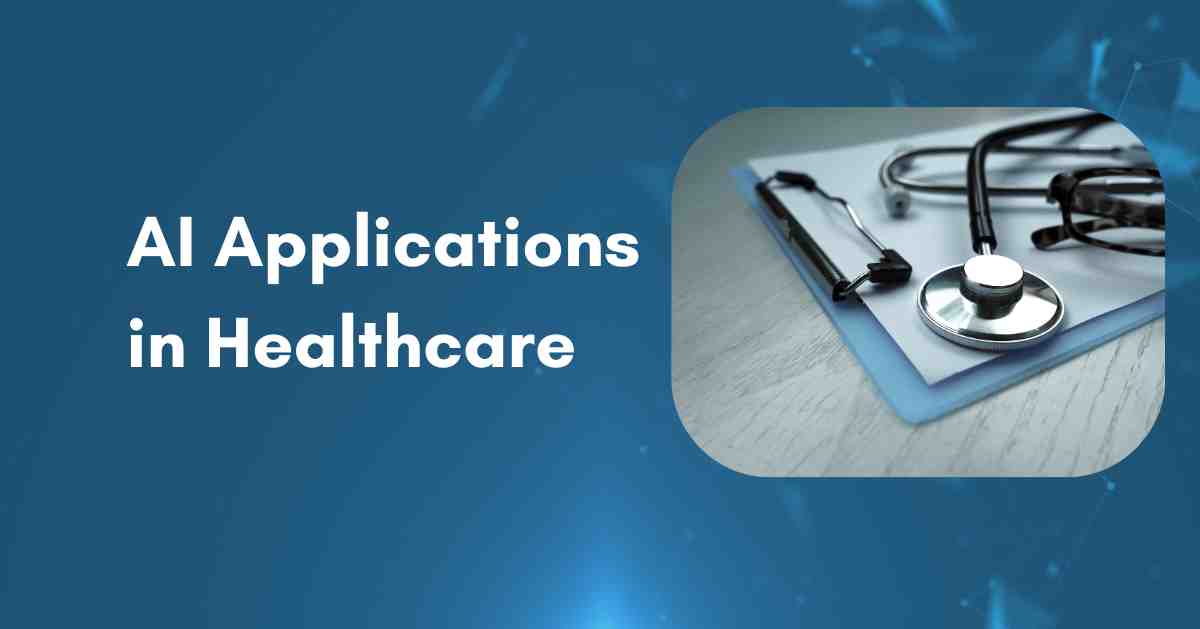Top AI Applications in Healthcare You Must Know

Introduction
AI Applications in Healthcare are no longer a distant promise—they run inside imaging suites, whisper suggestions in the clinic, and watch over patients at home. By 2026, 90 % of hospitals are expected to leverage some form of AI‑powered technology for early diagnosis or remote monitoring Dialog Health. That explosive uptake makes understanding the many applications of AI in healthcare essential for clinicians, executives, and innovators alike.
1. Defining the Landscape
At its core, an AI ML application in healthcare is any software or device that learns from data to improve clinical or operational decisions. Large‑language models (LLMs) now draft discharge summaries, while convolutional networks flag suspicious nodules on CT scans. Those dual engines—machine learning (ML) and generative AI—drive most AI applications in healthcare, and you’ll meet them in the following sections. JMIR
2. Medical Imaging & Diagnostics
Radiology remains the poster child for AI Applications in Healthcare. As of early 2025, the FDA has cleared 1,000+ clinical AI tools, 75 % of them for imaging Health Imaging. Algorithms detect strokes in minutes, classify breast lesions, and even quantify joint‑space narrowing for arthritis. Outside the scanner, dermatology apps match skin‑lesion photos against vast image libraries, pushing “derm‑in‑your‑pocket” triage closer to reality.
3. Predictive Analytics & Preventive Care
Hospitals already use AI risk scores to predict sepsis or 30‑day readmission; 65 % of U.S. facilities run such predictive models today, School of Public Health. On the population side, AstraZeneca’s ML model recently forecast the onset of 1,000 + diseases years before symptoms appear, World Economic Forum. These AI applications shift medicine from reactive to proactive, enabling earlier interventions and tighter care‑coordination loops.
4. Drug Discovery & Development
ML‑accelerated molecular screening slashes years (and billions) off R&D timelines. Generative models propose novel protein structures; reinforcement learning optimizes lead candidates. A 2024 analysis found AI shortened pre‑clinical discovery by 60 % for several oncology compounds, HealthTech Solutions. Pharmaceutical firms now treat AI and ML applications in healthcare as a competitive necessity, not a moonshot.
[Read About: Efficient Healthcare Management and Services ]
5. Personalized & Precision Medicine
Genomics plus AI yields therapy plans tailored to each patient’s tumor mutation or metabolic fingerprint. Meanwhile, dosage‑optimization engines adjust drug regimens in real time based on wearable glucose or blood‑pressure feeds—another fast‑growing family of applications of AI in healthcare.
6. Virtual Health Assistants & Ambient Scribes
LLM‑powered chatbots answer triage questions, refill requests, and medication FAQs in plain language. Inside the exam room, ambient‑listening AI captures physician‑patient dialogue, drafts SOAP notes, and can cut documentation time from 90 to < 30 minutes a day, WSJ. These AI applications in healthcare ease burnout while boosting visit capacity.
7. Robotic & AI‑Guided Surgery
Computer‑vision modules overlay tumor margins or blood‑flow maps on surgeons’ displays, while robotic arms execute millimeter‑perfect cuts. In orthopedics, ML optimizes joint‑replacement alignment, reducing revision rates. Such AI Applications in Healthcare exemplify the synergy between human dexterity and machine precision.
8. Administrative Optimization & Revenue Cycle
Up to 75 % of hospitals are now piloting AI to streamline coding, claims scrubbing, and prior‑authorization back-and-forth healthcarefinancenews.com. NLP engines extract billing codes directly from narratives; robotic process automation reduces denials. The result: faster cash flows and reclaimed staff hours.
9. Remote Patient Monitoring & Wearables
From smartwatches to ambient LiDAR sensors, AI crunches continuous streams of vitals and behavior. A May 2025 review highlighted four dominant RPM use cases: chronic‑disease management, post‑discharge surveillance, geriatric fall detection, and mental‑health relapse prediction. These AI applications in healthcare enable hospital‑at‑home models and keep fragile patients safer between visits.
10. Benefits & ROI Snapshot
| Metric | Impact Evidence |
| Diagnostic turnaround | Stroke‑alert AI cuts door‑to‑needle by 12 minutes on average, Health Imaging |
| Clinician documentation | Ambient scribes save ≈ 1 hour/shift WSJ |
| Drug‑discovery cost | 60 % drop in target‑identification time, HealthTech Solutions |
| Readmission rates | Predictive models lower 30‑day readmissions by 18 % at early adopter sitesSchool of Public Health |
Collectively, these wins explain why AI applications in healthcare earn board‑level mindshare.
11. Challenges & Ethical Guardrails
Even the most mature applications of ai in healthcare wrestle with bias, data silos, reimbursement gaps, and patient trust (only 29 % of U.K. consumers are ready to accept AI‑only advice World Economic Forum. Governance frameworks stressing transparency, human‑in‑the‑loop review, and rigorous post‑market surveillance are non‑negotiable.
12. The Road Ahead
Expect AI Applications in Healthcare to fuse with edge computing, quantum‑accelerated drug design, and self‑supervised multimodal models that digest imaging, text, waveforms, and genomics in one shot. Regulators are moving too—the FDA’s 2024 cross‑center AI policy now underpins faster, lifecycle‑based approvals, Food and Drug Administration. Investors agree: digital‑health IPOs like Hinge Health cite AI motion‑tracking and care‑coordination engines as key to future cash flowBusiness Insider.
Conclusion
From autonomous imaging reads to smart‑watch early warnings, the spectrum of AI Applications in Healthcare keeps expanding—and so do expectations. Whether you’re crafting policy, choosing vendors, or coding the next breakthrough, grounding strategies in the real‑world AI and ML application in healthcare evidence outlined here will help you ride the wave responsibly. As 2025 unfolds, one truth is clear: mastering AI in healthcare applications is no longer optional—it’s the new clinical competence.
